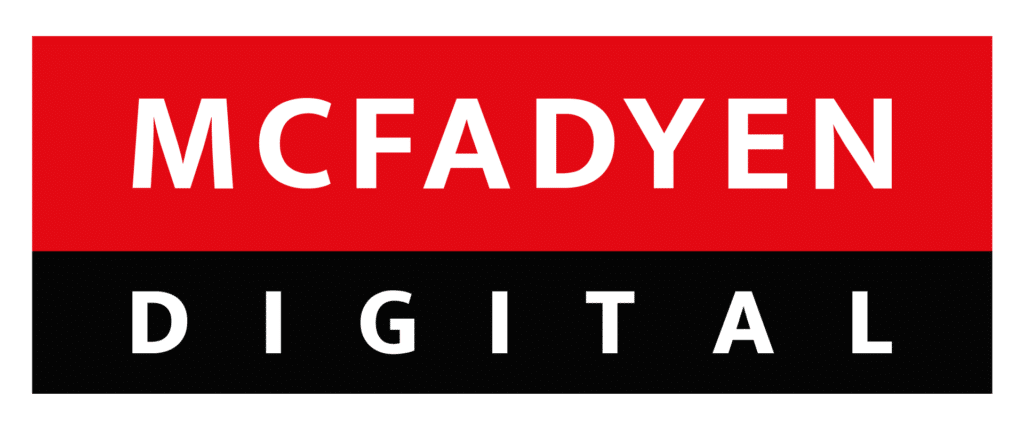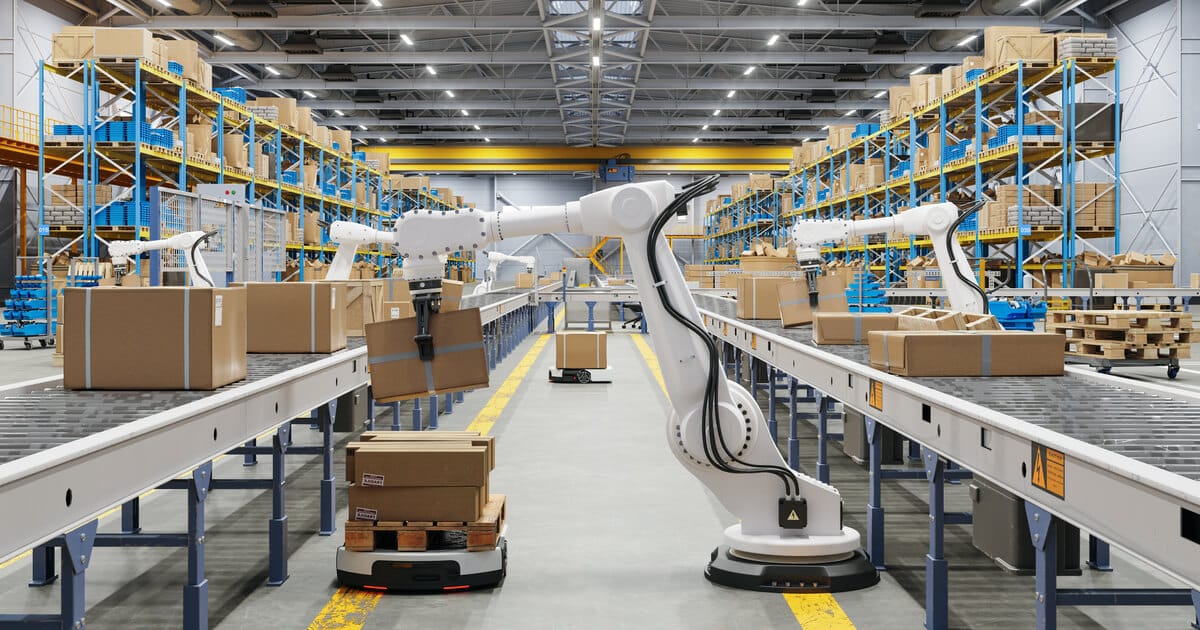
Recap of Europe’s premiere platform event where Chief Digital Officers, C-Levels and the technical management of the areas of digitization, innovation, and idea generators from all industries meet.
Introduction
On October 25 and 26, the Handelsblatt conference “Platforms and Ecosystems” took place in Düsseldorf (Handelsblatt Townhall), live on-site and digitally. The focus of the two-day event this year was on the question “Ecosystems, platforms, Web 3.0 and Metaverse as the answer to the strategic questions of German industry” It was indeed a pleasure for McFadyen Digital to participate and attend the conference. McFadyen was represented by Peter Evans, its Chief Strategy Officer. The event was hosted by the Handelsblatt Media Group, a leading media house for economic and financial information in Germany. With its top media brands and a broad portfolio of services, Handelsblatt commands a unique position in the market for business publishing in Germany and worldwide. The event brought together a wide range of German companies and experts and provided an excellent opportunity to survey Germany’s platform landscape.
Global Platform Landscape & Germany
The platform economy has gained steady momentum over the last two years due to increasing investments and digitization. The compounded effects of the spread of mobile devices, decentralized information networks, and big data analytics have enabled the emergence of digital platforms. The top 100 marketplace platforms of the world now account for over 17% of the global GDP, with healthy growth over the last year. US and China have been aggressively capturing more market share, whereas Europe is slowly catching up with the pace of digitalization. Platforms are helping solve the problem of the digitization gap by enabling the curation of digital services through their ecosystem. In this way, ecosystems play a critical role for enterprises as growth drivers to strengthen their market position.
Some of the significant challenges facing the platform companies include global and regional regulations, but at the same time, Sustainable Development Goals solution approaches present new opportunities. By their nature, platforms and ecosystems contribute value to solving these problems and creating new markets. New market structures with greater transparency and fairness are being built due to the anvil of Web 3.0 platforms, decentralized financial models (DeFi), asset tokenization (including NFT), crypto mechanisms, decentralized ecosystems, and the metaverse. Hence ecosystems and platforms are the keys to competitive advantage, digitization, and sustainable growth.
While Germany has shown tremendous growth in the digital transformation of industry towards the goal of increased manufacturing productivity and mass customization, research shows that more efforts are needed to accelerate the creation of platform-based digital business models. The conference provided an excellent overview of the steps the business based in Germany needs to take to close the digitization gap.
Focus Areas
The conference focussed on the following six areas to gauge ecosystems and platforms’ impact on enabling competitive advantage, digitization, and sustainable growth.
Market situation and trends of ecosystems and platforms
– China and the USA as role models?
– Potentials and challenges for the German and European Industry
– The new findings of the Top 100 Platforms
Solution approaches in digital transformation
– Platforms and ecosystems as enablers of successful digital strategies?
– Solving the fundamental digitization problems through the ecosystem
Potential of ecosystems and alliances
– Alliances as a growth factor: Through ecosystem cooperation to new market positioning.
– Prerequisites for cooperation and collaboration in ecosystems
Global and regional regulation of platforms
– Are platform models coming under increasing pressure to act?
– What impact will the new regulations in China have on the platform industry?
–Recognizing and exploiting competitive advantages: Measures and success factors
Impact of Web 3.0, Metaverse, NFT & Co.
– Web 3.0, Metaverse, and NFTs: Where are the future trends of decentralized models leading?
– The insights of the Top 100 NFT Platforms worldwide
– How do decentralized ecosystems create new market structures, transparency, and fairness?
Platforms for sustainability in the context of ESG and the SDGs:
– What value can platforms and ecosystems contribute to solving the SDGs and create new markets?
– Solution approaches from practice and industry examples
Some of the Noteworthy Sessions – Day 1
Geoff Parker, Professor of Engineering, Dartmouth; Research Fellow, MIT Sloan School Initiative on the Digital Economy, opened the event with a keynote discussing how network markets and ecosystems are transforming the economy. This was followed by Handelsblatt – Interview, where Geoff offered insights on the state of the platform economy both from a global and Europe perspective.
Cloud is one of the most important technological drivers of the digitization of enterprises. Axel Clauberg, Solution Architects Leader, AWS Deutschland, provided perspective on the impact of Cloud Computing on the business model, particularly emphasizing Germany’s business landscape. Axel discussed the requirements and barriers to using cloud services from a provider’s viewpoint and identified the actions and obstacles in meeting the needs and constraints of the customers. Axel was interviewed by Handelsblatt, where he fielded questions on the cloud-based business model and the uncertainty and risks it presents for user companies.
Hamidreza Hosseini, Founder & CEO of ECODYNAMICS, presented rich data on the Top 100 platforms worldwide. ECODYNAMICS was founded at the end of 2016 by Hamidreza Hosseini, who has more than 22 years of experience in management consulting. In addition to implementing digitization projects and digital business models, Ecodynamics focuses on digital business models, market-entry, traction, and growth measures.
Karl Wehner, Managing Director, Alibaba Group – Germany, Austria, Switzerland, CEE, and Turkey, delved into how the Metaverse offers Chinese consumers an immersive shopping experience.
Catalant Technologies CEO Patrick Petitti and Aravinda Souza, Senior Vice President, Marketing, presented a case study titled “A Stable Partnership for Unstable Times: How Catalant Created an Enterprise Platform for Consulting Disruption,” which showcased their capabilities across the consulting function and practice. Catalan’s expert marketplace gives enterprises access to people with the capabilities to execute any project.
Another interesting case study came from Bjorn Heismann, VP of Strategy Development, Diagnostic Imaging, Siemens, who gave a brilliant analysis of “AI in medicine covering opportunities and challenges for ecosystems.”
Toward the end of the day, there was a keynote session and interview with Stefan Schnorr – State Secretary Federal Ministry for Digitization and Transport (BMDV). Stefan provided an “Overview of the global and regional regulations impacting digitalization in the German markets.”
Some of the Noteworthy Sessions – Day 2
Day two began with a keynote from Peter Evans titled “Preparing for Web3: Corporate Strategy, Innovation, and Branding.” Peter is an advisor to McFadyen Digital, Co-Chairman, of the MIT Platform Strategy Summit, and Managing Partner of Platform Strategy Institute. He’s considered an eminent thought leader in digital transformation and platform strategy and a sought-after speaker on innovation-heavy topics related to Web3 businesses and technologies. Peter Evans discussed the implications of web3. He spoke on how blockchain technology influences corporate strategy, innovation, and branding. A key feature is the combination of tokenization and the rise of specialized platforms. These platforms include crypto exchanges like crypto.com, NFT marketplaces like OpenSea, and metaverse platforms like Decentraland. He highlighted that Web3 is creating new opportunities to create network effects and, therefore, new ways to engage, build loyalty and drive revenue. At the same time, Evans cautioned that companies must assess their ability to execute and adequately manage risk associated with these new technologies and more decentralized ways of doing business.
This was followed by an interview where Peter offered further insights on leveraging Web3 for enterprises to create a competitive advantage by being the first mover with a well-thought-out strategy.
Kai Herzberger, Group Director DACH, Group Director EMEA, and Meta delved into “What the Metaverse revolution means for the German economy.” This session was followed up by Hamidreza Hosseini, Founder & CEO of ECODYNAMICS, who offered his take on Platforms, Ecosystems, and Metaverses as an answer to the strategic questions of the industry.
“Metaverse and NFTs – Tech Hype or the Business of Tomorrow?” was the panel discussion topic between Louis Schulze, Ecosystem Development Manager, Founders Foundation, Sarah Schlagenhauf, Founder und CEO, ArtDeal, and Dr. Martha Boeckenfeld Thought Leader & Advisor, Dean & Partner, Metaverse Academy.
One of the most prominent sessions of the day was “You’ll Never Transform Alone,” co-presented by Cihan Sügür, Head of Corporate Development & Strategy, MHP – A Porsche Company, Michael Appel, Partner – Industrial Cloud Solutions, MHP – A Porsche Company, and Frank Goeller, Head of Digital Production, Volkswagen Group. Together they described the four steps needed to shape change and climb the mountain of digital platforms by collaborating using the power of value networks.
– Common goal: How they empower production and logistics by leveraging the potential of digital platforms to transform operations and boost efficiency gains.
– Network partners: A strong network of collaborators from production and logistics.
– Collaboration on equipment: Product orientation, collaboration, and collective empowerment.
-Shared learning effects: Challenging stages of transformation, complexity, organizational and technical challenges, in short: shared learning effects.
Observations & Key Takeaways
The value of platform business models is now deeply embedded. In contrast to five years ago, double-sided and multisided markets are no longer novel ideas. The focus now is on how best to leverage these business models to drive growth and productivity. This is true for the largest firms (e.g., Volkswagen AG, Siemens, Bosch, ThyssenKrupp, Henkel, etc.) and hundreds of platform startups representing a wide range of sectors.
At the same time, there are differences. Whereas b2c has been the focus in US and Asia, introducing and optimizing platform logic into supply chains has been crucial in Germany. The capabilities German companies are building in this area could well pay dividends down the line, especially if global supply chain disruptions persist.
German companies are positioning themselves to take advantage. German companies are not only building but also taking advantage of marketplaces orchestrated by others. The head of Alibaba.com, Deutschland, gave an impressive presentation on Alibaba’s next-generation platform ecosystems integrating supper apps, live shopping, metaverse, and other innovations.
At the same time, there are areas of uncertainty. Two stand out:
– Can platform strategies support the transition to a low-carbon world?
– Will web3 be a game changer, and how much should companies invest in this area?
Interestingly, these two areas are not necessarily separate. For example, SAP is combining ESG and web3 through the application of “green tokens”, which provide end-to-end material traceability and management through tokenization. Marketplaces offer the potential to scale these capabilities. Finally, there are constraints. One concerns the shortage of talent. There need to be more German-speaking platform professionals to meet demand. As a result, there is a widely recognized need for training and development in platform strategy, product management, ecosystem management, marketplace data architecture, and trust, safety, and security.
Related Articles
Turn Insight Into Impact.
Start Today.




